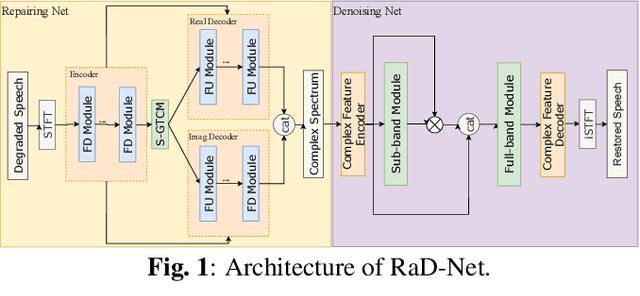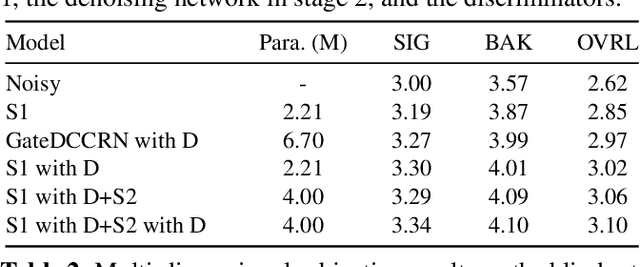Zhuangqi Chen
RaD-Net 2: A causal two-stage repairing and denoising speech enhancement network with knowledge distillation and complex axial self-attention
Jun 11, 2024



Abstract:In real-time speech communication systems, speech signals are often degraded by multiple distortions. Recently, a two-stage Repair-and-Denoising network (RaD-Net) was proposed with superior speech quality improvement in the ICASSP 2024 Speech Signal Improvement (SSI) Challenge. However, failure to use future information and constraint receptive field of convolution layers limit the system's performance. To mitigate these problems, we extend RaD-Net to its upgraded version, RaD-Net 2. Specifically, a causality-based knowledge distillation is introduced in the first stage to use future information in a causal way. We use the non-causal repairing network as the teacher to improve the performance of the causal repairing network. In addition, in the second stage, complex axial self-attention is applied in the denoising network's complex feature encoder/decoder. Experimental results on the ICASSP 2024 SSI Challenge blind test set show that RaD-Net 2 brings 0.10 OVRL DNSMOS improvement compared to RaD-Net.
RaD-Net: A Repairing and Denoising Network for Speech Signal Improvement
Jan 09, 2024


Abstract:This paper introduces our repairing and denoising network (RaD-Net) for the ICASSP 2024 Speech Signal Improvement (SSI) Challenge. We extend our previous framework based on a two-stage network and propose an upgraded model. Specifically, we replace the repairing network with COM-Net from TEA-PSE. In addition, multi-resolution discriminators and multi-band discriminators are adopted in the training stage. Finally, we use a three-step training strategy to optimize our model. We submit two models with different sets of parameters to meet the RTF requirement of the two tracks. According to the official results, the proposed systems rank 2nd in track 1 and 3rd in track 2.
 Add to Chrome
Add to Chrome Add to Firefox
Add to Firefox Add to Edge
Add to Edge